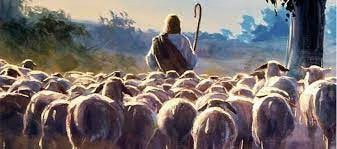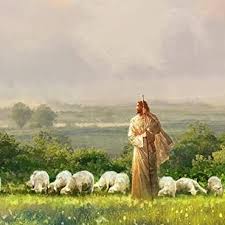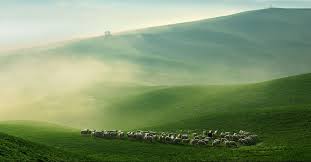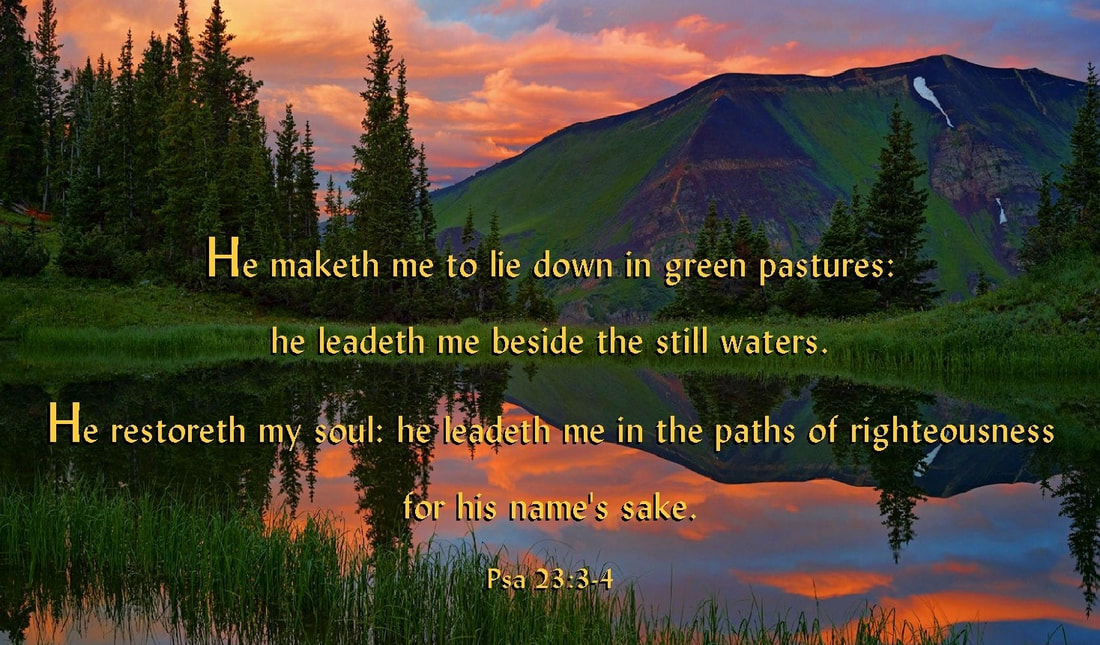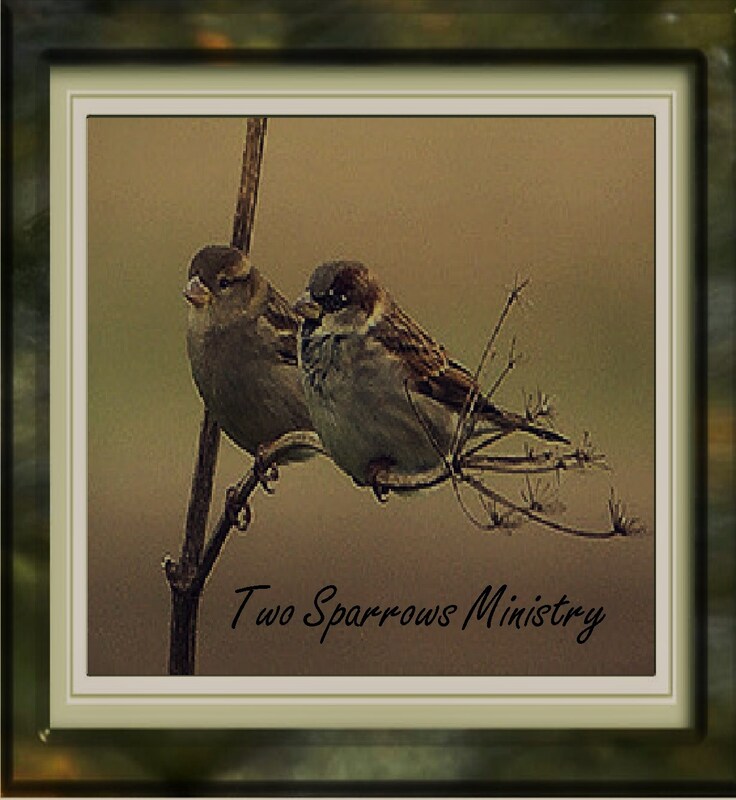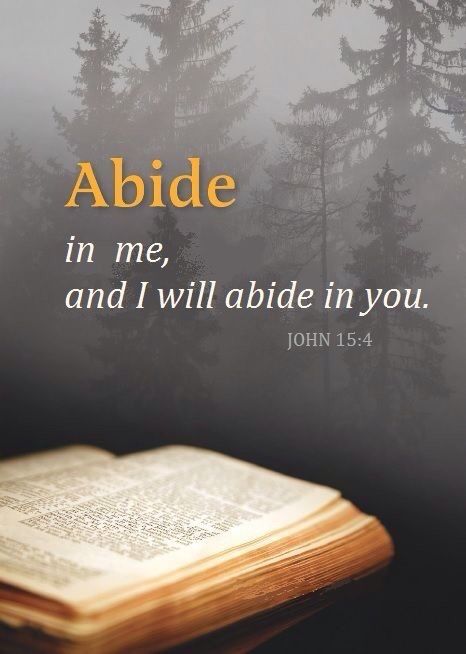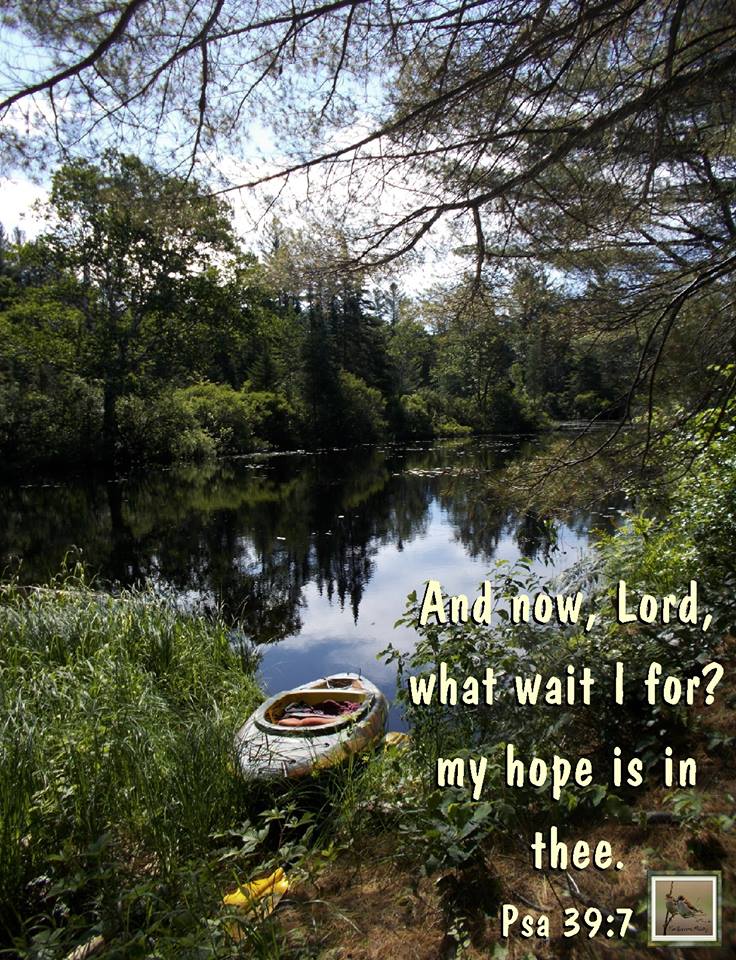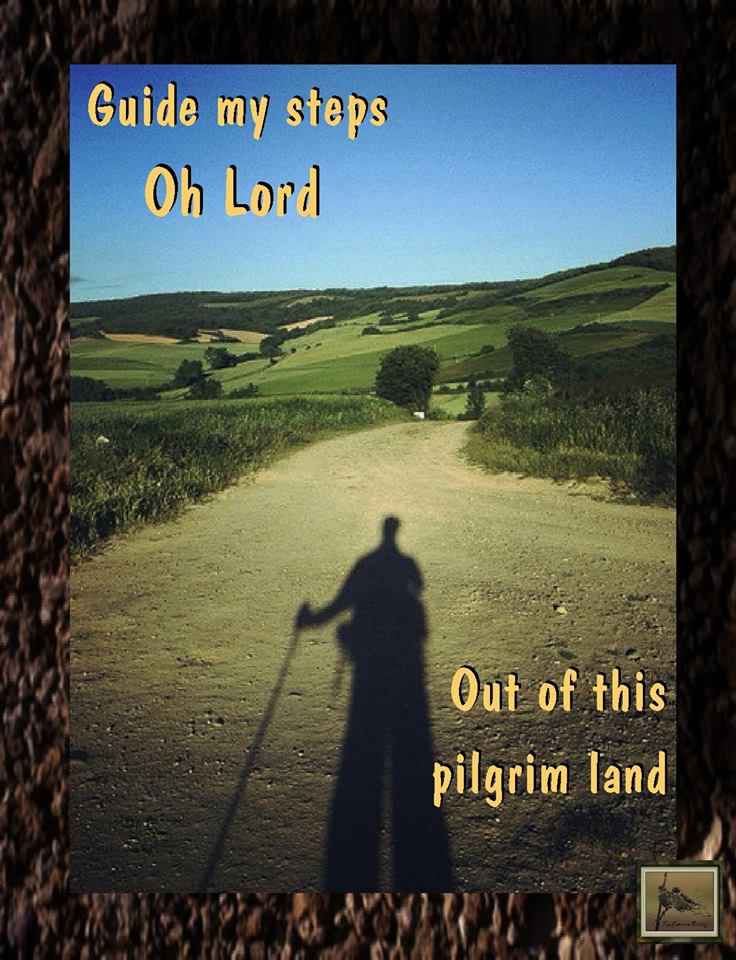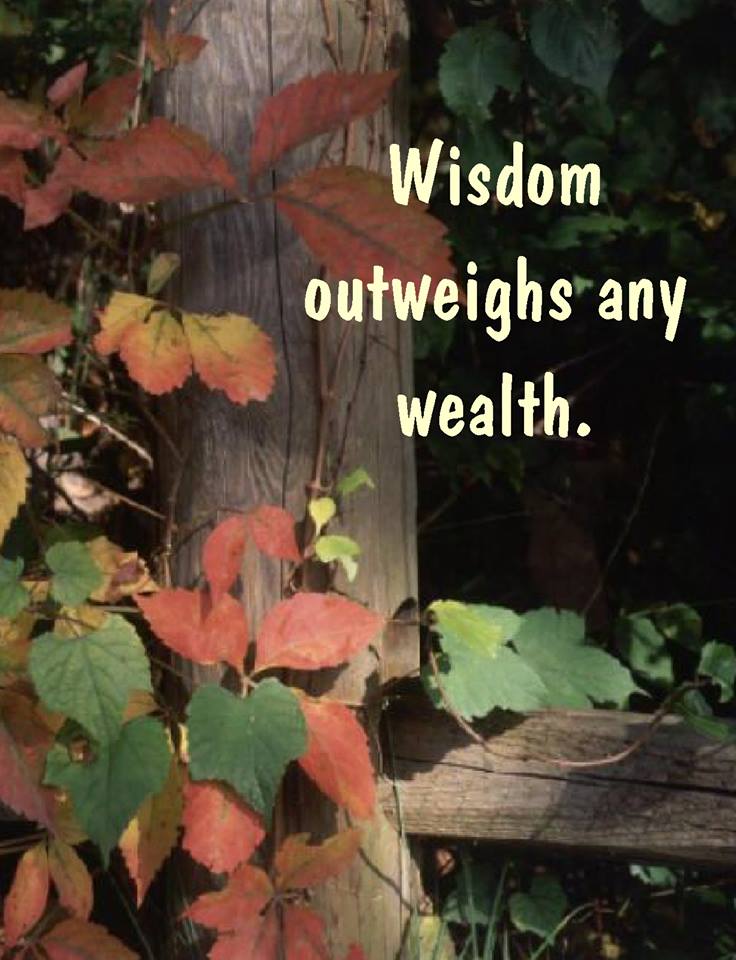The Lord Is My Shepherd
Psa 23:1 A Psalm of David. The LORD is my shepherd; I shall not want.
Psa 23:2 He maketh me to lie down in green pastures: he leadeth me beside the still waters.
Psa 23:3 He restoreth my soul: he leadeth me in the paths of righteousness for his name's sake.
Psa 23:4 Yea, though I walk through the valley of the shadow of death, I will fear no evil: for thou art with me; thy rod and thy staff they comfort me.
Psa 23:5 Thou preparest a table before me in the presence of mine enemies: thou anointest my head with oil; my cup runneth over.
Psa 23:6 Surely goodness and mercy shall follow me all the days of my life: and I will dwell in the house of the LORD for ever.
Psa 23:2 He maketh me to lie down in green pastures: he leadeth me beside the still waters.
Psa 23:3 He restoreth my soul: he leadeth me in the paths of righteousness for his name's sake.
Psa 23:4 Yea, though I walk through the valley of the shadow of death, I will fear no evil: for thou art with me; thy rod and thy staff they comfort me.
Psa 23:5 Thou preparest a table before me in the presence of mine enemies: thou anointest my head with oil; my cup runneth over.
Psa 23:6 Surely goodness and mercy shall follow me all the days of my life: and I will dwell in the house of the LORD for ever.
Jesus is Lord and King, Conqueror, Savior, the Mighty God, Prince of Peace, the Christ, Emmanuel, Teacher, Prophet and Master. Of the many titles given to the Lord, Shepherd must undoubtedly be one of His favorite. It links Him in the most personal way to those He loves.
Say it out loud and let the truth settle deep in your heart: “The Lord is my Shepherd.”
Isaiah prophesied, “He shall feed his flock like a shepherd: he shall gather the lambs with his arm, and carry them in his bosom, and shall gently lead those that are with young.” (Isa_40:11). Peter preached, “For ye were as sheep going astray; but are now returned unto the Shepherd and Bishop of your souls.” (1Pe_2:25).
David, himself a shepherd, penned the Twenty-third Psalm as a comprehensive tribute to the Lord. He encompasses in this short poem at least fifteen provisions that are made for us when we follow the Lord as our Shepherd.
Say it out loud and let the truth settle deep in your heart: “The Lord is my Shepherd.”
Isaiah prophesied, “He shall feed his flock like a shepherd: he shall gather the lambs with his arm, and carry them in his bosom, and shall gently lead those that are with young.” (Isa_40:11). Peter preached, “For ye were as sheep going astray; but are now returned unto the Shepherd and Bishop of your souls.” (1Pe_2:25).
David, himself a shepherd, penned the Twenty-third Psalm as a comprehensive tribute to the Lord. He encompasses in this short poem at least fifteen provisions that are made for us when we follow the Lord as our Shepherd.
The Lord's Provision
“The Lord is my Shepherd…
shall not want for Rest – for He maketh me to lie down in green pastures
I shall not want for Peace – for He leadeth me beside the still waters
I shall not want for Restoration – for He restoreth my soul
I shall not want for Guidance – for He leadeth me in paths of righteousness for His name’s sake.
I shall not want for Courage – for though I walk through the valley of the shadow of death, I will fear no evil
I shall not want for Companionship – for Thou art with me
I shall not want for Comfort – for Thy rod and Thy staff comfort me
I shall not want for Sustenance – Thou preparest a table before me in the presence of my enemies
I shall not want for Blessing – Thou anointest my head with oil
I shall not want for Fulness – My cup runneth over
I shall not want for Abundant Life – goodness and mercy will follow me all the days of my life
I shall not want for Eternal Security – I will dwell in the house of the Lord forever
You can see, there is nothing left out. No wonder David said, “I shall not want!” The Lord gives us everything we need when we follow Him as our Shepherd.
“And now may the God of peace, who brought again from the dead our Lord Jesus, equip you with all you need for doing his will. May he who became the great Shepherd of the sheep by an everlasting agreement between God and you, signed with his blood, produce in you through the power of Christ all that is pleasing to him. To him be glory forever and ever. Amen.” (Heb_13:20-21). (Rylisms)
shall not want for Rest – for He maketh me to lie down in green pastures
I shall not want for Peace – for He leadeth me beside the still waters
I shall not want for Restoration – for He restoreth my soul
I shall not want for Guidance – for He leadeth me in paths of righteousness for His name’s sake.
I shall not want for Courage – for though I walk through the valley of the shadow of death, I will fear no evil
I shall not want for Companionship – for Thou art with me
I shall not want for Comfort – for Thy rod and Thy staff comfort me
I shall not want for Sustenance – Thou preparest a table before me in the presence of my enemies
I shall not want for Blessing – Thou anointest my head with oil
I shall not want for Fulness – My cup runneth over
I shall not want for Abundant Life – goodness and mercy will follow me all the days of my life
I shall not want for Eternal Security – I will dwell in the house of the Lord forever
You can see, there is nothing left out. No wonder David said, “I shall not want!” The Lord gives us everything we need when we follow Him as our Shepherd.
“And now may the God of peace, who brought again from the dead our Lord Jesus, equip you with all you need for doing his will. May he who became the great Shepherd of the sheep by an everlasting agreement between God and you, signed with his blood, produce in you through the power of Christ all that is pleasing to him. To him be glory forever and ever. Amen.” (Heb_13:20-21). (Rylisms)
THE SONG OF THE GOOD SHEPHERD
| A sabbatic rest breathes through this psalm, the children’s favorite; while the oldest and holiest confess that it touches an experience which still lies before them. Here is no strife, no fear, no denunciation, and no self-vindication. Jehovah is represented as the Shepherd, the Guide, and the Host of His people. We are taught to think less of our attitude toward Him and more of His responsibility for us. The flock does not keep the shepherd, but the shepherd keeps the flock. Look away from yourself and trust Him with all, in all, and for all. |
Let God see to your wants. You need nothing outside of Him. His pastures are “tender grass;” His waters, “waters of rest.” He refreshes us when exhausted; heals when diseased; restores from wandering; leads in right paths, though steep; accompanies us into the valley with club for our foes and crook for the pits; spreads our table amid hatred; and protects our rear with the twin-angels, goodness and mercy! F.B. Meyer
The Lord is My Shepherd
Spurgeon's Treasury of David
Spurgeon's Treasury of David
Psa 23:1
“The Lord is my shepherd.” What condescension is this, that the Infinite Lord assumes towards his people the office and character of a Shepherd! It should be the subject of grateful admiration that the great God allows himself to be compared to anything which will set forth his great love and care for his own people. David had himself been a keeper of sheep, and understood both the needs of the sheep and the many cares of a shepherd. He compares himself to a creature weak, defenceless, and foolish, and he takes God to be his Provider, Preserver, Director, and, indeed, his everything. No man has a right to consider himself the Lord's sheep unless his nature has been renewed, for the scriptural description of unconverted men does not picture them as sheep, but as wolves or goats. A sheep is an object of property, not a wild animal; its owner sets great store by it, and frequently it is bought with a great price. It is well to know, as certainly as David did, that we belong to the Lord. There is a noble tone of confidence about this sentence. There is no “if” nor “but,” nor even “I hope so;” but he says, “The Lord is my shepherd.” We must cultivate the spirit of assured dependence upon our heavenly Father. The sweetest word of the whole is that monosyllable, “My.” He does not say, “The Lord is the shepherd of the world at large, and leadeth forth the multitude as his flock,” but “The Lord is my shepherd;” if he be a Shepherd to no one else, he is a Shepherd to me; he cares for me, watches over me, and preserves me. The words are in the present tense. Whatever be the believer's position, he is even now under the pastoral care of Jehovah.
The next words are a sort of inference from the first statement - they are sententious and positive - “I shall not want.” I might want otherwise, but when the Lord is my Shepherd he is able to supply my needs, and he is certainly willing to do so, for his heart is full of love, and therefore “I shall not want.” I shall not lack for temporal things. Does he not feed the ravens, and cause the lilies to grow? How, then, can he leave his children to starve? I shall not want for spirituals, I know that his grace will be sufficient for me. Resting in him he will say to me, “As thy day so shall thy strength be.” I may not possess all that I wish for, but “I shall not want.” Others, far wealthier and wiser than I, may want, but I shall not.” “The young lions do lack, and suffer hunger but they that seek the Lord shall not want any good thing.” It is not only “I do not want,” but “I shall not want.” Come what may, if famine should devastate the land, or calamity destroy the city, “I shall not want.” Old age with its feebleness shall not bring me any lack, and even death with its gloom shall not find me destitute. I have all things and abound; not because I have a good store of money in the bank, not because I have skill and wit with which to win my bread, but because “The Lord is my Shepherd.” The wicked always want, but the righteous never; a sinner's heart is far from satisfaction, but a gracious spirit dwells in the palace of content.
Psa 23:2
“He maketh me to lie down in green pastures; he leadeth me beside the still waters.” The Christian life has two elements in it, the contemplative and the active, and both of these are richly provided for. First, the contemplative, “He maketh me to lie down in green pastures.” What are these “green pastures” but the Scriptures of truth - always fresh, always rich, and never exhausted? There is no fear of biting the bare ground where the grass is long enough for the flock to lie down in it. Sweet and full are the doctrines of the gospel; fit food for souls, as tender grass is natural nutriment for sheep. When by faith we are enabled to find rest in the promises, we are like the sheep that lie down in the midst of the pasture; we find at the same moment both provender and peace, rest and refreshment, serenity and satisfaction. But observe: “He maketh me to lie down.” It is the Lord who graciously enables us to perceive the preciousness of his truth, and to feed upon it. How grateful ought we to be for the power to appropriate the promises! There are some distracted souls who would give worlds if they could but do this. They know the blessedness of it, but they cannot say that this blessedness is theirs. They know the “green pastures,” but they are not made to “lie down” in them. Those believers who have for years enjoyed a “full assurance of faith” should greatly bless their gracious God.
The second part of a vigorous Christian's life consists in gracious activity. We not only think, but we act. We are not always lying down to feed, but are journeying onward toward perfection; hence we read, “he leadeth me beside the still waters.” What are these “still waters” but the influences and graces of his blessed Spirit? His Spirit attends us in various operations, like waters - in the plural to cleanse, to refresh to fertilise, to cherish. They are “still waters,” for the Holy Ghost loves peace, and sounds no trumpet of ostentation in his operations. He may flow into our soul, but not into our neighbour's, and therefore our neighhour may not perceive the divine presence; and though the blessed Spirit may be pouring his floods into one heart, yet he that sitteth next to the favoured one may know nothing of it.
“In sacred silence of the mind
My heaven, and there my God I find.”
Still water runs deep. Nothing more noisy than an empty drum. That silence is golden is indeed in which the Holy Spirit meets with the souls of his saints. Not to raging waves of strife, but to peaceful streams of holy love does the Spirit of God conduct the chosen sheep. He is a dove, not an eagle; the dew, not the hurricane. Our Lord leads us beside these “still waters;” we could not go there of ourselves, we need his guidance, therefore is it said, “he leadeth me.” He does not drive us. Moses drives us by the law, but Jesus leads us by his example, and the gentle drawings of his love.
“The Lord is my shepherd.” What condescension is this, that the Infinite Lord assumes towards his people the office and character of a Shepherd! It should be the subject of grateful admiration that the great God allows himself to be compared to anything which will set forth his great love and care for his own people. David had himself been a keeper of sheep, and understood both the needs of the sheep and the many cares of a shepherd. He compares himself to a creature weak, defenceless, and foolish, and he takes God to be his Provider, Preserver, Director, and, indeed, his everything. No man has a right to consider himself the Lord's sheep unless his nature has been renewed, for the scriptural description of unconverted men does not picture them as sheep, but as wolves or goats. A sheep is an object of property, not a wild animal; its owner sets great store by it, and frequently it is bought with a great price. It is well to know, as certainly as David did, that we belong to the Lord. There is a noble tone of confidence about this sentence. There is no “if” nor “but,” nor even “I hope so;” but he says, “The Lord is my shepherd.” We must cultivate the spirit of assured dependence upon our heavenly Father. The sweetest word of the whole is that monosyllable, “My.” He does not say, “The Lord is the shepherd of the world at large, and leadeth forth the multitude as his flock,” but “The Lord is my shepherd;” if he be a Shepherd to no one else, he is a Shepherd to me; he cares for me, watches over me, and preserves me. The words are in the present tense. Whatever be the believer's position, he is even now under the pastoral care of Jehovah.
The next words are a sort of inference from the first statement - they are sententious and positive - “I shall not want.” I might want otherwise, but when the Lord is my Shepherd he is able to supply my needs, and he is certainly willing to do so, for his heart is full of love, and therefore “I shall not want.” I shall not lack for temporal things. Does he not feed the ravens, and cause the lilies to grow? How, then, can he leave his children to starve? I shall not want for spirituals, I know that his grace will be sufficient for me. Resting in him he will say to me, “As thy day so shall thy strength be.” I may not possess all that I wish for, but “I shall not want.” Others, far wealthier and wiser than I, may want, but I shall not.” “The young lions do lack, and suffer hunger but they that seek the Lord shall not want any good thing.” It is not only “I do not want,” but “I shall not want.” Come what may, if famine should devastate the land, or calamity destroy the city, “I shall not want.” Old age with its feebleness shall not bring me any lack, and even death with its gloom shall not find me destitute. I have all things and abound; not because I have a good store of money in the bank, not because I have skill and wit with which to win my bread, but because “The Lord is my Shepherd.” The wicked always want, but the righteous never; a sinner's heart is far from satisfaction, but a gracious spirit dwells in the palace of content.
Psa 23:2
“He maketh me to lie down in green pastures; he leadeth me beside the still waters.” The Christian life has two elements in it, the contemplative and the active, and both of these are richly provided for. First, the contemplative, “He maketh me to lie down in green pastures.” What are these “green pastures” but the Scriptures of truth - always fresh, always rich, and never exhausted? There is no fear of biting the bare ground where the grass is long enough for the flock to lie down in it. Sweet and full are the doctrines of the gospel; fit food for souls, as tender grass is natural nutriment for sheep. When by faith we are enabled to find rest in the promises, we are like the sheep that lie down in the midst of the pasture; we find at the same moment both provender and peace, rest and refreshment, serenity and satisfaction. But observe: “He maketh me to lie down.” It is the Lord who graciously enables us to perceive the preciousness of his truth, and to feed upon it. How grateful ought we to be for the power to appropriate the promises! There are some distracted souls who would give worlds if they could but do this. They know the blessedness of it, but they cannot say that this blessedness is theirs. They know the “green pastures,” but they are not made to “lie down” in them. Those believers who have for years enjoyed a “full assurance of faith” should greatly bless their gracious God.
The second part of a vigorous Christian's life consists in gracious activity. We not only think, but we act. We are not always lying down to feed, but are journeying onward toward perfection; hence we read, “he leadeth me beside the still waters.” What are these “still waters” but the influences and graces of his blessed Spirit? His Spirit attends us in various operations, like waters - in the plural to cleanse, to refresh to fertilise, to cherish. They are “still waters,” for the Holy Ghost loves peace, and sounds no trumpet of ostentation in his operations. He may flow into our soul, but not into our neighbour's, and therefore our neighhour may not perceive the divine presence; and though the blessed Spirit may be pouring his floods into one heart, yet he that sitteth next to the favoured one may know nothing of it.
“In sacred silence of the mind
My heaven, and there my God I find.”
Still water runs deep. Nothing more noisy than an empty drum. That silence is golden is indeed in which the Holy Spirit meets with the souls of his saints. Not to raging waves of strife, but to peaceful streams of holy love does the Spirit of God conduct the chosen sheep. He is a dove, not an eagle; the dew, not the hurricane. Our Lord leads us beside these “still waters;” we could not go there of ourselves, we need his guidance, therefore is it said, “he leadeth me.” He does not drive us. Moses drives us by the law, but Jesus leads us by his example, and the gentle drawings of his love.
